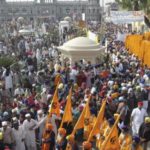The recent remarks of the All India Majlise-Ittehadul Muslimeen (AIMIM) chief Asaduddin Owaisi that he won’t raise the slogan ‘Bharat Mata Ki Jai’ (Long Live Motherland), even if someone puts a knife to his throat, became the raging controversy in the Indian mainstream political and social circles. A veteran Bollywood actor Anupam Kher went on another extreme when he tweeted that chanting “Bharat Mata Ki Jai” should be the only definition of nationalism for those living in India, all others are escape routes.
In the same context, the famous lyricist and parliamentarian Javed Akhtar earned laurels nationwide for lashing out at Owasi in his farewell speech in Rajya Sabha, when he said, “He (Owasi) said he will not say ‘Bharat Mata Ki Jai’ as the Constitution does not require him to say so. The Constitution even does not ask him to wear sherwani (dress) and topi (cap)… I don’t care to know whether saying ‘Bharat Mata Ki Jai’ is my duty or not, it is my right”.
If we rationally consider these statements, the ones uttered by Mr Owasi and Mr Kher represent orthodox and extreme views while that of Mr Akhtar appears liberal and rational.
The controversy reminds the days of August 2011 when Anna Hazare was leading the campaign of the India Against Corruption (IAC) movement and he was on fast-unto-death at New Delhi’s Ramlila Maidan. Many Muslims were noticed chanting slogans of Vande Matram and Bharat Mata Ki Jai and later too during the electoral campaigns of Arvind Kejrawal, convenor Aam Admi Party. Obviously, many Muslims did not have reservations about the slogan but because they look at the BJP and RSS with suspicion, hence such a call from them generates negative response.
Origin of Bharat Mata dates back to the later part of nineteenth century and the inspiration behind this conception was the famous Bengali writer Bankim Chandra Chattopadhyay (1838-1894). In his novel Anandamath, he wrote the song Vande Matram wherein the land of birth has been personified as Bharat Mata and in a particular stanza symbolized her with the Goddess Durga. He perhaps did it with a view to generate patriotic feelings among Indians to rise against the British rule. The Muslims, however, believe that to sing the song would tantamount to worshiping the deity Bharat Mata, while Islam prohibits idol worship, hence they are against it.
It is true that the majority Muslims look at the BJP and RSS with suspicion. The reasons are many and quite obvious. Firstly, BJP does not pursue appeasement policy unlike Congress and some regional parties. Then BJP’s stand on Article 370 of Constitution, accusations of love-jihad, opposition of beef consumption, talks of withdrawing the minority status to Aligarh Muslim University etc are some of the issues which Muslims feel, are against their interests.
If the likes of Owasi and their vehement opposition to a slogan represent one extreme, the tweet of the Anupam Kher, however well-intentioned, setting new definition of nationalism for Indians represents another extreme. Such a moral policing would perhaps neither be of any help in generating patriotic or nationalist sentiments in this land of diversities nor in any way strengthen our democracy.
While rationalists and liberals in both communities would agree that there is no need of going in semantics of the slogans ‘Bharat Mata Ki Jai’, ‘Vande Matram’ or ‘Jai Hind’ in the modern times, at they essentially convey the same abstract meaning i.e. our love, respect and allegiance to the land of our birth. Semantics are not so important because it is our love and sentiments for the nation that really matters. Liberals like Javed Akhtar and many others understand this point but those who do not realize should also not be forced to do it with coercion or violence.
Since ancient ages, the Indian culture has imbibed and spread the spirit of tolerance encouraging open debate and dissent. In the modern India, the Constitution of India only further strengthened this spirit in embracing freedom of speech and expression, right to worship and equality.
There is no doubt that people like Owasi need to have serious introspection to realize that they are doing disservice to their country for petty political gains when they resort to fanning such unwarranted controversies often with communal overtones. At the same time, other people should also not try to force words to mouth of others that smack of extreme vigilantism. Politicians, clerics, celebrities and media need to play more responsibly because common folk look at them for guidance and following. Extreme and odd views and utterances are best ignored and downplayed rather than given undue attention through name-calling, legal action or violent means.
Traditionally, Indian civilization and culture has enough maturity and strength to mock rather than hound odd-ball dissidents. Jingoism may be one extreme shade of the patriotism, but it has many other shades in the land of diversity like ours. Needless to emphasize that the well written Constitution in India exists as the guiding force, with an independent and capable judiciary for supervision and interpretation, when unreasonable and unruly try to fiddle with or suppress voice of the reason.
Image source: Internet (Public Domain)
3,172 total views, 3 views today
















No Comments
Leave a comment Cancel